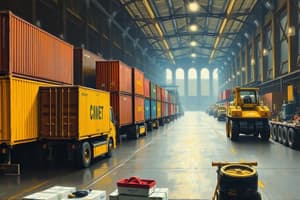Podcast
Questions and Answers
What is the technique that consists of running multiple operating systems on a computer simultaneously?
What is the technique that consists of running multiple operating systems on a computer simultaneously?
- Hypervisor
- Paravirtualization
- Virtualization (correct)
- Containerization
What is a hypervisor?
What is a hypervisor?
- A machine running on distinct computers
- A type of container in Docker
- A process that enhances security
- A software that creates and executes virtual machines (correct)
What is a disadvantage of virtualization mentioned in the text?
What is a disadvantage of virtualization mentioned in the text?
- Augments hardware costs
- Increases complexity and consumes resources (correct)
- Improves scalability
- Facilitates management
Which type of virtualization has a hypervisor that runs directly on host hardware?
Which type of virtualization has a hypervisor that runs directly on host hardware?
What is the main reason for using virtualization according to the text?
What is the main reason for using virtualization according to the text?
In virtualization, what does a hypervisor do?
In virtualization, what does a hypervisor do?
What is the main difference between a Process, Container, and VM?
What is the main difference between a Process, Container, and VM?
How does Docker utilize the concept of a distributed system of servers?
How does Docker utilize the concept of a distributed system of servers?
What role does the Docker engine play in managing containers?
What role does the Docker engine play in managing containers?
How do Containers differ from Virtual Machines (VMs) in terms of resource allocation?
How do Containers differ from Virtual Machines (VMs) in terms of resource allocation?
What is the main advantage of having multiple independent operating systems in Virtual Machines (VMs)?
What is the main advantage of having multiple independent operating systems in Virtual Machines (VMs)?
How does Docker differ from traditional virtualization methods?
How does Docker differ from traditional virtualization methods?
What command is used to run an interactive Docker container with a specific name?
What command is used to run an interactive Docker container with a specific name?
Which command is used to remove all unused volumes in Docker?
Which command is used to remove all unused volumes in Docker?
In Docker, what does the command 'docker ps -aq' do?
In Docker, what does the command 'docker ps -aq' do?
What is the purpose of the shebang '#!/bin/bash' at the beginning of a script?
What is the purpose of the shebang '#!/bin/bash' at the beginning of a script?
What does the command 'docker images --no-trunc' display?
What does the command 'docker images --no-trunc' display?
Study Notes
Containerization vs Virtualization
- Containers are created from images and can be stopped, restarted, or transferred to another machine.
- Containers are isolated groups of processes managed by a shared kernel.
Dockers
- Docker is written in Go and is a client-server application.
- The Docker engine is a client-server application, with the CLI client (docker) communicating with the server (dockerd) through a REST API.
- Docker allows emulation of a distributed system of servers and orchestration of multiple daemons with their respective containers as a service.
Virtualization
- Virtualization is a technique that allows running multiple operating systems on a single computer simultaneously.
- Virtual Machines (VMs) are simulated operating systems that run on a host computer's hardware resources.
- Hypervisors create and execute VMs, allocating host resources to guest machines.
Benefits of Virtualization
- Reduces downtime by executing multiple OS/applications simultaneously on the same machine.
- Facilitates management, faster provisioning, and improves scalability, versatility, and resiliency.
- Allows running software/peripheral that cannot run on host hardware, and enables testing in a controlled environment.
Drawbacks of Virtualization
- Increases complexity, and the abstraction layer affects performance, consuming resources.
Paravirtualization
- Paravirtualization is a type of virtualization where the hypervisor (type 1) runs directly on host hardware, offering performance close to real hardware.
- Guest OS must be adapted for paravirtualization.
Docker Commands
docker run -it --name mon-linux-shell ubuntu bashcreates a new container from an image.docker exec -it mon-linux-shell shruns a new command in an existing container.
Cleaning Up Docker Resources
docker ps -aq | xargs -r docker rm -fremoves all containers.docker images --no-trunc | awk '{ print $3 }' | xargs -r docker rmiremoves unused images.docker volume ls -qf dangling=true | xargs -r docker volume rmremoves unused volumes.
Studying That Suits You
Use AI to generate personalized quizzes and flashcards to suit your learning preferences.
Related Documents
Description
Test your knowledge on containers, processes, and virtual machines. Learn about the differences between processes, containers, and virtual machines in terms of isolation, resource management, and boot time.



